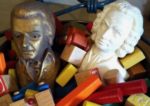What’s On The Inside
 “Wow !” I said, “You are like a different pianist!” And she was. Before, there had been surges and awkward accents in the opening to her Intermezzo, impossible to remove despite hard work on both of our parts. Now, after one week on meds for ADHD, there was a beautiful calm flow and elegance about it—the melody and bass line sang and the harmonies filled in but never interrupted the long lines.
“Wow !” I said, “You are like a different pianist!” And she was. Before, there had been surges and awkward accents in the opening to her Intermezzo, impossible to remove despite hard work on both of our parts. Now, after one week on meds for ADHD, there was a beautiful calm flow and elegance about it—the melody and bass line sang and the harmonies filled in but never interrupted the long lines.
I have taught students with ADHD before but have never had a person diagnosed as a young adult. My student told me that she noticed little choices that had never been in her head before. She was glowing with happiness and I was happy for her. Finally, her interactions with the world match the lively and intelligent young woman that she is.
We do a lot of listening activities in my studio. Over the years, I have noticed that many times a student who is struggling musically will demonstrate through these oral and written activities that they truly are able to hear, subtly and maturely. Their bodies let them down and what comes out of the piano is not at all what is felt or understood inside. That doesn’t mean that the lessons of music study have not been well and truly learned.
When I was diagnosed with Spinal Arthritis, I was faced with the same problem. My body was letting me down. “Ha!” it would say. “Really, you want me to play that LH run? How about 80% of it and I get to decide which 80% on the fly?!” A person could lose all self confidence and be reluctant to play not only on account of the pain, but because each day is a game of chance in which your body decides how much of your potential you get to live up to.
I once had an older student who had survived two massive strokes. Her doctor told her that playing the piano had literally saved her life. She never compared her current self to her former self. She never complained about only being able to play simple repertoire when she had once been a piano teacher who played sonatas. She celebrated every new achievement- every ounce of finger independence and eye hand coordination she gained.
We need to remember that we are not defined by these troublesome bodies of ours. OK, so they are bailing on us. We don’t need to be frightened of or shy about playing. We don’t need to feel guilty. We need to do the best we can everyday—the good ones and the bad ones. Being honest with ourselves and fighting to do our best no matter what is a redemptive act. If someone has an issue with our best, it is absolutely that person’s problem and not ours.
As teachers, we need to find ways for students to be able to show what is inside and appropriate ways for them to let the world see. We need to be sure that they are able to maintain their self confidence, participate in music, and share their personal viewpoints with joy.
Just now I found this wonderful middle school project from a former student, who I will call BZ. He had taken lessons from me for 3 years and I thanked his Mom profusely for this evidence that lessons weren’t in vain.
All I Need to Know About Life I Learned From The Piano
If you find the keys to life you’ll do well
Play the right notes and you’ll go far
Be sharp about everything you do
Sometimes being flat is OK, other times it’s not
You should have technique in all your life
Keep the important parts longer
You don’t need to be loud to get your point across
Some parts of life are soft
Sound can tell a whole story
Fingers should be nimble and so should the brain
Take life slow at first, then speed up
Put your whole self into everything that you do
Think before you play or do anything
Earlier pianos were upright like earlier in the day- later they were made horizontal like you are when you sleep
Think before you play or do anything
Outline before you write the final piece
Notes in life should be clear
If you don’t practice you’ll never get better
Good form is important in everything that you do
Outside appearances don’t matter, it’s the inside that counts
This young man stopped his lessons when he was about 15 and I didn’t hear from him for quite a while. One afternoon, while I was getting ready for teaching, the door flew open and there he was. “Here” he said thrusting a CD into my hand, “I want you to have this.” It was his band’s very first recording. I still treasure this gift. Just last fall, now in medical school, he gave me a call again. “I need some help with a project I’m working on.” The project consisted of some Fats Waller songs and he wanted help with the chord symbols. He looked at me sheepishly. “I don’t know how well you remember me, but I don’t read well.” Read smead! He read enough to analyze the piano part and figure out the chords even though he wasn’t sure about the symbols. He had found a way to use his stronger aspects to the fullest to compensate for his weaker ones.



Awesome. I struggle with chronic problems as well. I’m going to print this out and frame it!
Valerie
In the words of Monty Python, otherwise we are perfectly fine!
What an inspired article! Having myself suffered with tendonitis for years, I know what it feels like when your body fails your mind. Thanks for sharing!